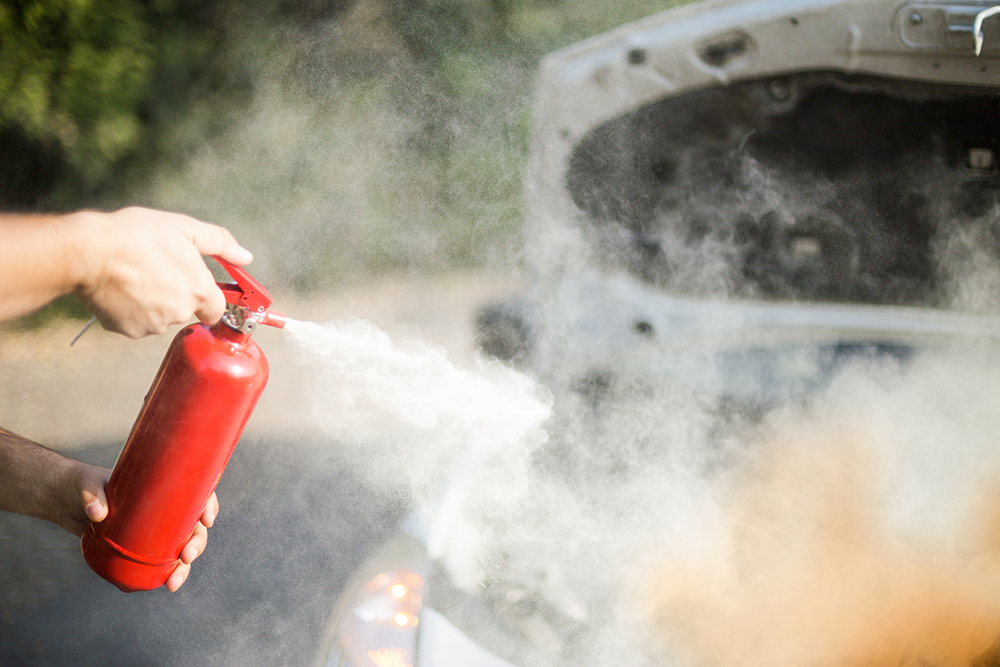
Most of us have been there. We’ve been driving down a local Lexington street, or an interstate, or perhaps one of Kentucky’s many state highways, when we’ve come across a big plume of smoke and traffic backed up for miles.
As we inched closer to where the blaze was happening, we saw a car burning out of control. You probably experienced a sense of relief if you saw the fire department already there trying to extinguish the fire and what appeared to be the vehicle occupants safe and sound.
However, seeing all this may have left you with lingering questions, including what to do if your car catches fire?
In this post, we’ll not only address that question but also explain how to minimize the chances of your car igniting, and what to do if you couldn’t stop it from happening, and you get hurt.
Steps To Take When a Vehicle Fire Ignites
Take the following steps if your vehicle catches on fire:
- Turn on your hazard lights and pull over as swiftly as possible
- Turn your car off
- Don’t open the trunk or the hood if you believe it’s the source of the fire
- Vacate the vehicle and get 100 or more feet away from it (and traffic)
- Call 911 for help
- Don’t return to your vehicle for anything that you forgot; cell phones included
As far as getting away from your burning vehicle, this is particularly important for your immediate safety and, if you have an electric car, it’s important for a whole other reason. Electric cars emit both hydrogen chloride and hydrogen fluoride when they burn, which are toxic to breathe in, this is why you’ll see fire personnel don special masks when tending EV fires.
Also, while responding, fire crews should be able to quickly extinguish a gas car’s fire; doing so may take longer if it spreads to the grass or any nearby structures. Putting out a fire involving an electric car can take a lot of time and water. As for the latter, it took an astounding 36,000 gallons of water to quell a recent Tesla fire in the south.
Why Car Fires Occur
If your car has suddenly begun to burn, you likely want answers as to why. Common reasons for fires involving motor vehicles include:
- Engine overheating: This is most commonly caused by broken radiators, residual coolant leaks, operating a vehicle in extremely hot weather, or forcing it to operate across rugged terrain, such as a steep incline for a prolonged period of time.
- Electrical issues: Wires that have deteriorated with age or been gnawed by rodents, improperly installed, or defective aftermarket auto parts—these are just a few examples of electrical issues that may start a fire.
- Catalytic converter issues: Vehicles come equipped with catalytic converters to accelerate combustion and dispersal of pollutants from the car’s engine and thus reduce emissions. This part, which is located on the underside of a vehicle, can reach 1,000 degrees, and while protected by a heat shield, should something happen to it, those temperatures can set anything under the vehicle, like grass, ablaze, causing a fast-moving fire.
- Liquid and gas leaks: If there’s a fuel line leak or the cap isn’t properly tightened on your oil reservoir after an oil change, these substances can trickle down and accumulate onto metal, which can become hot. Couple that with exposure to a flame, and you have a massive fire.
Are Certain Vehicles More Likely to Ignite Than Others?
It may be easy to assume that gas-powered automobiles are more likely to catch on fire, whereas electric and hybrid cars are not, but that’s certainly not the case. Any type of vehicle can experience a fire.
As an example involving a gas-powered automobile, this past September, the National Highway Traffic Safety Administration announced a recall of more than 3 million Hyundai and Kia passenger cars and SUVs, with model years ranging from 2010 to 2019.
They did so after discovering that the control module for the affected vehicles’ anti-lock brake system could potentially cause a fluid leak, an ensuing electrical short, and fire both while the vehicle was parked and in motion.
Another example involving an electric car, a quick internet search reveals countless news stories involving Teslas and other EV makes. In one case this past summer, a Tesla reportedly spontaneously became engulfed with fire.
Countless other stories include motorists traveling down the roadway or merely having their vehicle parked in their driveway when batteries or other vehicle components suddenly ignited.
How To Prevent Automobiles from Catching on Fire
While motorists may not be able to take any preventative action to reduce the chances of their vehicle catching fire, especially if there’s some kind of unknown manufacturing defect that hasn’t yet been discovered, there are other proactive measures drivers can take to minimize the chances of such an outcome occurring, including:
- Keeping up-to-date on recalls: The National Highway Traffic Safety Administration has a VIN lookup tool that allows you to see if your car or equipment, tires, and car seats have been recalled. You should also receive a letter in the mail notifying you of the impending recall and what to do to any suspected mechanical issue repaired at no cost to you. Don’t ignore these warnings, as common defects can pose potential fire risks. Prioritize getting your vehicle serviced instead.
- Be mindful of your lithium-ion battery-powered devices: Smartphones, backup battery chargers, handheld game systems, and countless other electronic devices come equipped with lithium-ion batteries that, when overcharged or exposed to extreme heat, can potentially be fire-prone. To minimize the chances of a fire, be careful not to leave items like these in your vehicle and to dispose of them properly if their appearance changes (i.e., they “bubble up”).
- Have a mechanic regularly service your vehicle: One of the most common causes of car fires are leaky fluids or gasses, like oil and fuel, or running out of them. Especially engine coolant, which may cause the automobile to overheat and burn surrounding components. Another concern is exposed wires (as when wildlife gets under the hood and chews them up). You can increase the chances of avoiding these concerns, and greatly enhancing your safety, by having a competent mechanic regularly inspect your vehicle.
- Be careful about how you transport flammable substances: It’s common for Kentucky residents to transport kerosene for their heater, propane for their grill, gasoline for their lawn mower, and canisters of other potentially flammable substances between a gas station or other retailer and their homes or worksites. All it takes is someone lighting up a cigarette near your vehicle or for a rear-end or T-bone crash to occur, and the canister being breached, for a fast-spreading fire to happen. While not carrying these flammable substances may be out of the question, you should take precautions. Set them upright and flat, tightly screw on the top, and open your windows to keep your car properly ventilated during transport.
One good rule of thumb to prevent your vehicle from being set ablaze is to also be extra cautious when driving around. This is important whether your vehicle has a known defect or you’re carrying around flammable items or not.
Vehicle Fire Statistics
Statistics published by the National Fire Protection Association show that, in 2018 alone, there were approximately 212,500 car fires nationwide. That same data shows that those blazes resulted in 1,500 civilians suffering injuries and 560 of them losing their lives.
Our hope at Peterson Law Office is that knowing why vehicle fires occur, how to prevent them, and what to do if one happens, will keep you from getting hurt or losing your life.
However, if you didn’t see this information before it was too late and you’ve suffered burns or other injuries, contact our law firm today. We’ll put you in contact with a Lexington car accident attorney to discuss your legal options in a free initial consultation.





